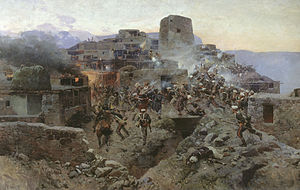This article relies largely or entirely on a single source. (November 2021) |
| Battle of Gimry | |||||||
|---|---|---|---|---|---|---|---|
| Part of the Caucasian War | |||||||
 The Storming of Gimry, an 1891 painting by Franz Roubaud | |||||||
| |||||||
| Belligerents | |||||||
|
|
| ||||||
| Commanders and leaders | |||||||
|
|
| ||||||
| Strength | |||||||
| 10,000 | 600–3,000 | ||||||
| Casualties and losses | |||||||
|
41 killed 339 wounded | 176 killed | ||||||
The Battle of Gimry, fought on 17–18 October 1832 during the Murid War, was General Aleksey Velyaminov's capture of Ghazi Muhammad's headquarters at Gimry. Ghazi Muhammad was killed but Imam Shamil escaped.
In early October (all dates old style), Velyaminov left Temir-Khan-Shura (Buynaksk) 25 km to the east. The route led through early snow across a broad and level plateau which slowly rises from 1500 feet to 6000 feet and then suddenly drops 5000 feet down into the canyon of the north-flowing Avar Koysu. In many places the canyon walls are almost vertical. Gimry is on the east side of the river at the mouth of a side canyon which extends about 7 km southeast. There were two paths down into the canyon, neither of which was fit for an army. Velyaminov chose the eastern one leading to the head of the side canyon where the drop is about 3000 feet. (Today there is a long automobile tunnel from the plateau to the head of the side canyon.) Taking advantage of the morning mist Velyaminov got his advance guard down to the side canyon, in places using ropes and ladders, and spent several days cutting an approximation of a road. This took from the 10th to the 13th, on the 14th Baron Rosen came up with more soldiers and by the 17th most of the force was concentrated at the upper side canyon.[1]